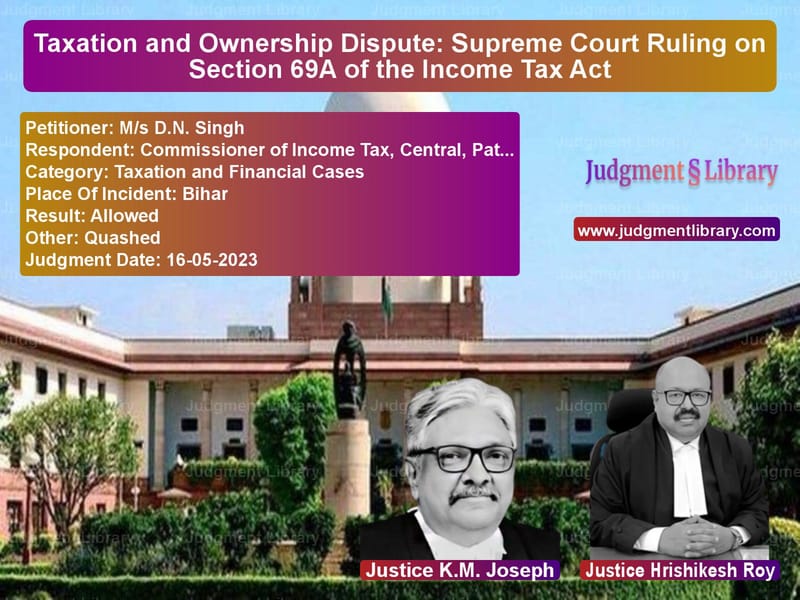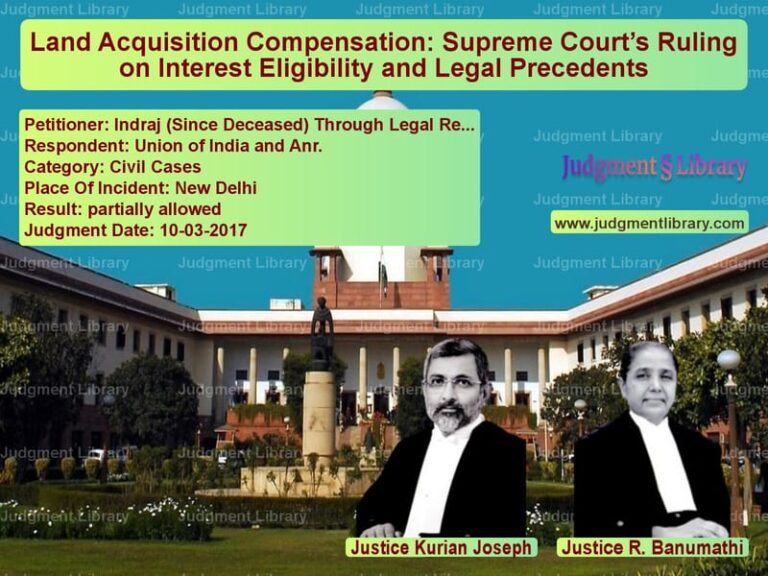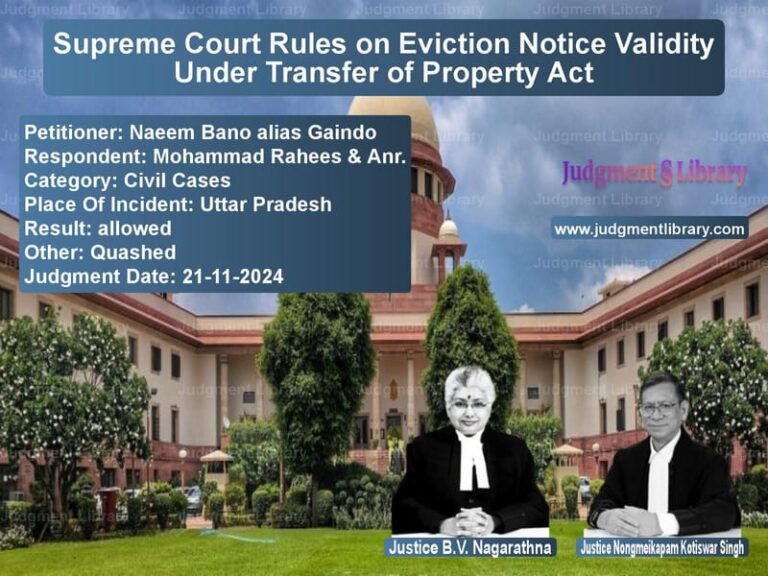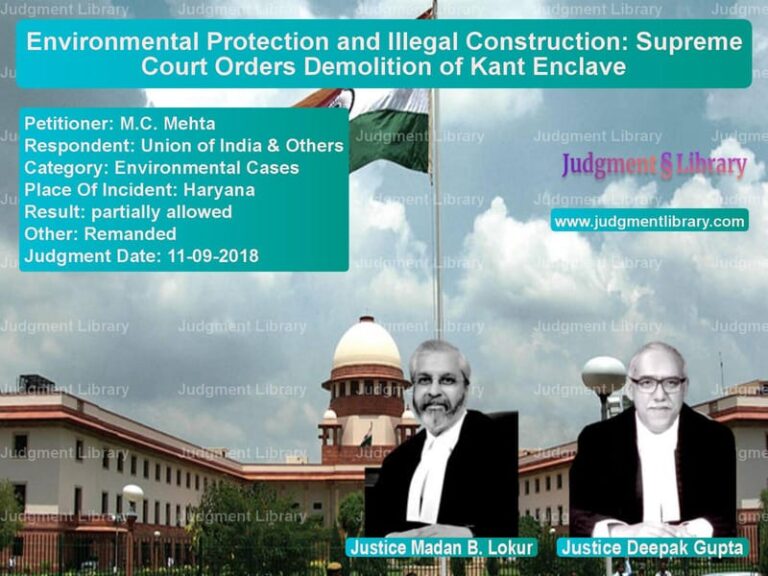Taxation and Ownership Dispute: Supreme Court Ruling on Section 69A of the Income Tax Act
The case of M/s D.N. Singh v. Commissioner of Income Tax, Central, Patna & Another revolves around a significant dispute in tax law regarding the interpretation of Section 69A of the Income Tax Act, 1961. The Supreme Court was tasked with determining whether the appellant, a carrier of bitumen, could be considered the owner of the goods under Section 69A and whether bitumen itself qualifies as a ‘valuable article’ for taxation purposes.
The appellant, a transportation contractor, was responsible for delivering bitumen from oil companies like HPCL, IOCL, and BPCL to various divisions of the Road Construction Department of Bihar. However, an alleged scam suggested that transporters were misappropriating bitumen instead of delivering it. As a result, the Income Tax Department assessed additional income against the appellant, treating the undistributed bitumen as taxable undeclared income.
Background of the Case
The dispute began in the assessment year 1995-1996, when an assessment officer found that the appellant had lifted 14,507.81 metric tonnes of bitumen but had only delivered 10,064.1 metric tonnes, leaving an unexplained shortfall of 4,443.1 metric tonnes. The department applied Section 69A, deeming the shortfall as undisclosed income.
The appellant challenged this finding, claiming that bitumen had been fully delivered. To support this claim, the appellant provided photocopies of delivery challans. However, upon inquiry, certain junior engineers denied receiving the full quantity, prompting the Income Tax Department to persist in its taxation claims.
Petitioner’s Arguments
The petitioner’s counsel argued:
- The appellant was a carrier and not the owner of the bitumen, and therefore, he could not be taxed under Section 69A.
- Section 69A applies only when an assessee is the ‘owner’ of money, bullion, jewellery, or other valuable articles. The appellant, as a transporter, did not meet this requirement.
- Bitumen does not qualify as a ‘valuable article’ in the manner intended by the law, which primarily targets high-value items such as gold, bullion, and jewellery.
- As per legal precedents, a person cannot be deemed the owner of property merely because he is in possession of it.
Respondent’s Arguments
The Commissioner of Income Tax and the government argued:
- The appellant had failed to deliver the full quantity of bitumen, meaning he had retained possession, effectively making him the owner.
- Section 69A allows for taxation of undeclared income, and since the missing bitumen was never accounted for, its value should be treated as taxable income.
- Even if bitumen is not typically categorized as a ‘valuable article,’ its significant market value in bulk form qualifies it as such under the section.
- The junior engineers’ testimony confirmed non-receipt of a substantial quantity of bitumen, reinforcing the department’s case.
Supreme Court Judgment
The case was heard by Justice K.M. Joseph and Justice Hrishikesh Roy. The Supreme Court considered two primary issues:
1. Could the appellant be treated as the ‘owner’ of the bitumen?
The Court held that merely possessing bitumen does not make the appellant its owner. The judgment stated:
“A bailee, who is a common carrier, is not an owner of the goods. Ownership does not transfer simply due to possession.”
Since the appellant’s role was only to transport bitumen, any shortfall did not establish ownership under Section 69A.
2. Is bitumen a ‘valuable article’ under Section 69A?
The Supreme Court analyzed the term ‘valuable article’ in the context of tax law, stating:
“For an item to be a ‘valuable article,’ it must be intrinsically costly, not merely of high value due to bulk quantity.”
The Court ruled that bitumen, a residual byproduct of petroleum refining used primarily for road construction, does not fall into the same category as money, bullion, or jewellery.
Final Verdict
The Supreme Court ruled in favor of the appellant, holding:
- Bitumen is not a ‘valuable article’ under Section 69A, as it is a common commodity rather than a high-value item.
- The appellant, being a mere transporter, could not be treated as the owner of the bitumen for taxation purposes.
- The assessment under Section 69A was invalid, and the tax demand was quashed.
The ruling sets a crucial precedent in tax law, clarifying that the interpretation of ‘ownership’ and ‘valuable articles’ under Section 69A must align with legislative intent and practical business operations.
Read also: https://judgmentlibrary.com/supreme-court-orders-fresh-decision-in-income-tax-settlement-case/
Petitioner Name: M/s D.N. Singh.Respondent Name: Commissioner of Income Tax, Central, Patna & Another.Judgment By: Justice K.M. Joseph, Justice Hrishikesh Roy.Place Of Incident: Bihar.Judgment Date: 16-05-2023.
Don’t miss out on the full details! Download the complete judgment in PDF format below and gain valuable insights instantly!
Download Judgment: ms-d.n.-singh-vs-commissioner-of-inco-supreme-court-of-india-judgment-dated-16-05-2023.pdf
Directly Download Judgment: Directly download this Judgment
See all petitions in Income Tax Disputes
See all petitions in Tax Evasion Cases
See all petitions in Judgment by K.M. Joseph
See all petitions in Judgment by Hrishikesh Roy
See all petitions in allowed
See all petitions in Quashed
See all petitions in supreme court of India judgments May 2023
See all petitions in 2023 judgments
See all posts in Taxation and Financial Cases Category
See all allowed petitions in Taxation and Financial Cases Category
See all Dismissed petitions in Taxation and Financial Cases Category
See all partially allowed petitions in Taxation and Financial Cases Category







